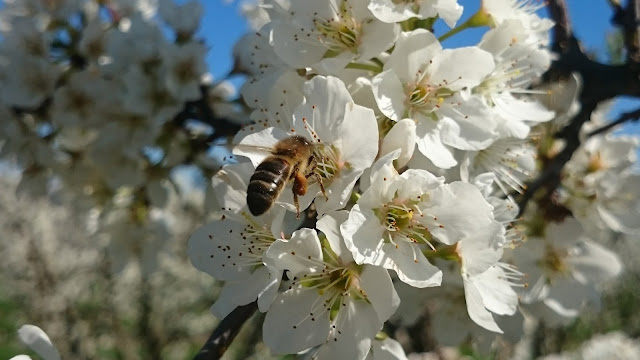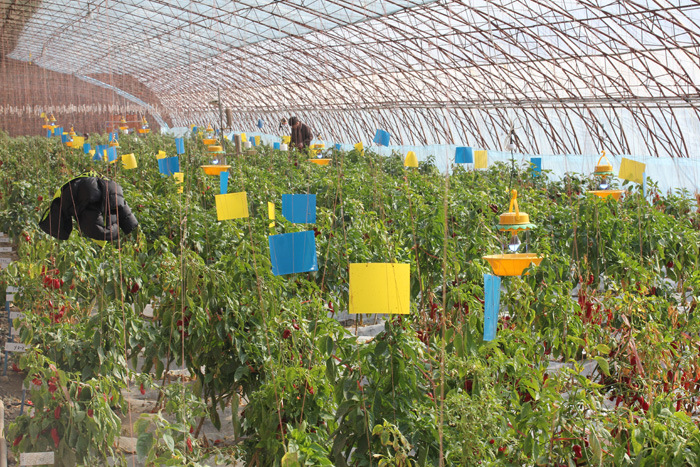PESTICIDES:
SURGICAL CONTROL
The use of
insecticides, synthetic or natural, even if very well applied, always involves
negative side effects.
The farmer
must protect his crop against, for example, a specific type of aphid. But at
the same time, by his aphic spraying, he will eliminate all other present
aphids, beetles, lepidoptera and other harmful insects, but also a large number
of useful insects (bees, lacewings, ladybugs and other auxiliary insects), and
also a great number of insects, neither pests nor auxiliaries, just present,
such as mosquitoes or flies.
It's a
general spraying, with a product chosen for the targeted problem, but always
more or less versatile, thus also acting on non-target insects.
Modern
insecticides are not perfect, it would be known, but their side effects have
been considerably reduced compared to their elders prior to the years 70-80.
Indeed, since that time the legislation, and consequently the search for new
molecules, has placed an absolute priority on reducing the direct side effects
of pesticides. These include, among other criteria, risks to water, soil,
birds, mammals, aquatic fauna and flora, auxiliary insects, but also to health
risks for users and consumers.
Nothing is
perfect, no doubt, but toxicological and environmental profiles of the current
products are, despite their defects, incomparably more favorable than those of
the old molecules, most of which are currently banned.
However, the
versatility of action of a pesticide remains a serious problem still
unresolved. Today, only the techniques of "sexual confusion" or
"mass trapping" arrive at an almost perfect specificity, thanks to
the use of specific pheromones.
Side effects
of insecticides are harmful because reducing the presence of many non-harmful
insects reduces the feeding potential of many other animals (rodents including
bats, birds, reptiles), and thus biodiversity on the farm.
Reducing
biodiversity on the farm reduces predation pressure on insect pests, thus
increasing their impact on crops.
In
short, it is the snake that bites itself the tail. We spray to avoid damage,
but by spraying, we reduce the biodiversity, so the pressure of pests increases
and the risks of damage also, forcing to spray more.
This is one
of the great arguments of environmentalists, and in this sense they are right.
But beware, all this does not prevent that the initial attack, the one that
caused the spraying which caused in turn the imbalance, was very real. The
farmer then needed to spray, and he probably did it right. The problem lies in
the means at his disposal to solve his problem.
It's so true
that ecological production must also solve these same problems with
insecticides, natural, of course, but not without side effects, with
consequences for biodiversity that are often comparable, at least in the short
term.
The stupid
speeches claiming that "organic can feed the world" or "if we
suppress food waste, we will solve hunger in the world", are above all an
intellectualization of the concepts, and especially the rejection on others of
supposed mistakes.
Yet most of
the food waste in poor countries occurs in the fields, due to damage from
diseases and insects. And that, in agricultural systems that don't use
pesticides.
But that's
another debate.
Humanity
continues to grow inexorably.
If this is
added to the urbanization that is gaining on agricultural land, the effects of
soil erosion, which is still too often uncontrolled, and the essential need to
master freshwater resources, then the control of food production is undoubtedly
one of the major challenges of humanity for the 21st century. And if we speak
of mastery of production we speak of reduction of the non-consumable part, thus
among others, damage of insects or diseases.
Personally,
I have no doubt that in the coming years we will be able to maintain, and
probably even increase, agricultural productivity while greatly reducing its
negative impact on the environment.
But
I don't doubt either that we will continue to need natural AND synthetic
pesticides.
And it's
now, after this long introduction, that comes the subject of the day, recovered
on Twitter https://twitter.com/collemyria/status/900489867108470785
ISCA
Technologies' scientific team (https://iscatech.com/),
an American company specializing in alternative crop protection technologies
(traps, attractants, repellents, etc.) recently presented the results of its
research on mosquitoes, so as to minimize the negative effects of mosquito
control, in situations where mosquitoes are a real danger by the transmission
of many diseases, including dengue, zika, chikungunya or malaria.
"Researchers collected the
fragrance of flowers and other plants that produce nectar. Then, they used gas
chromatography and electro-triennial detection (GC-EAD) to separate and
identify the odorous compounds found there. They exposed mosquito antennas to thousands
of these compounds to determine which ones could have a biological effect. They
also eliminated perfumes or aromas that could attract bees. Finally, they used
a semi-chemical mixture in a matrix containing sugars and proteins to mimic 20
frequent chemical signals that attract mosquitoes by prompting them to feed."
The idea is
to achieve a mix of the specific attractant with a modern insecticide. This
mixture is applied to specific spots in limited number. The mosquito is
irresistibly attracted by the mixture, which eliminates it.
"The mix of chemicals we use
to attract mosquitoes is so powerful that they will ignore natural flavors of
plants to go to our formulation," says Agenor Mafra-Neto of the
research team.
This
technique is currently destined for mosquitoes to reduce the incidence of
infectious diseases. Moreover, as the article says, "researchers conduct field trials in Tanzania where 93% of the
population is in a risk of malaria. In preliminary results, they found that
mosquito populations declined by two-thirds in just two weeks in treated
communities [...] compared to untreated populations."
This seems
to me an extraordinary piece of news.
Extraordinary,
of course, for the resolution of diseases transmitted by mosquitoes and for the
populations exposed to them.
But
extraordinary also insofar as it opens the door to the same work on insect pests
for food production. One could then carry out totally targeted treatments, with
high efficiency, but extremely reduced negative effects.
This
technique is already used in agriculture, for example against the Mediterranean
fruit fly (Ceratitis capitata). It is a spot bait treatment. It consists in
dispersing small spots of the mixture in the crop which will attract the insect
and kill it, with a very low negative impact. It depends on the quality of the
bait. If it's powerful enough, the insect turns away from the crop to go on the
insecticide spot.
So of
course, all this does not necessarily have only qualities. Assuming that in the
future we will be able to select specific attractants for all crop pests, we
may find ourselves in a situation where secondary insects, now controlled by
the versatility of insecticides, appear again with a high incidence, because of
the very high selectivity of the technique.
But
let's be positive. The experience of sexual confusion, a very specific
technique used on a large scale and throughout the world for at least 25 years,
had few consequences of this type. It's true that sporadically some
"secondary" insects can become damageable but, with some exceptions,
the gravity is generally low.
From this
type of technique, by similarity to the effects observed for the Mediterranean
fruit fly, one can reasonably expect, depending mainly on the effectiveness of
the attractant:
-
Maintaining or even improving the effectiveness of the protection,
- Reduction
of insecticide application rates from 80 to 90% per hectare for spot bait
treatment, and more if what works is mass trapping,
- Reduction
of insecticide losses by drift to the vicinity of the crop (uncultivated areas,
waterbodies and rivers, neighboring crops) or by leaching by rain, by at least
90%,
-
Consequently an almost total elimination of the negative side effects of the
use of insecticides,
- A
combination of these new generation attractants with synthetic insecticides
(for duration of action) or natural insecticides (for organic production),
- For some
pests at least, the possibility of using the insecticide without affecting
directly the crop (application to the cover planting, on sticky patches or in
traps), thus a complete elimination of the risk of residues on the final food.
Under these conditions
we can expect a considerable improvement in the techniques of application of
insecticides and an almost complete elimination of the negative side effects of
the use of insecticides.
In the same
way that sexual confusion is widely used in both conventional and organic
agriculture, it is to be hoped that these techniques will find their place
quickly and on a large scale in all farms.
It remains
for us to hope that researchers and chemists will make rapid progress in this
technique, bringing versatility by increasing the number of possible target
insects.
This
seems to me to be a major innovation for the evolution of agriculture towards
more virtuous production and for more efficient and sustainable food
production.







Thanks for sharing this post of plant protection.
RépondreSupprimerAppreciate your blog post
RépondreSupprimer